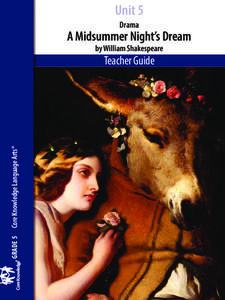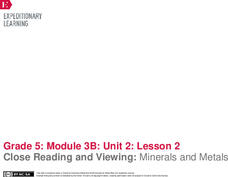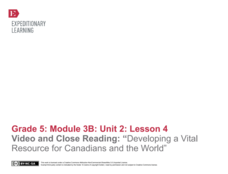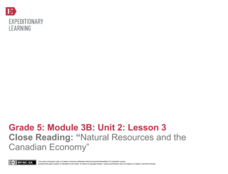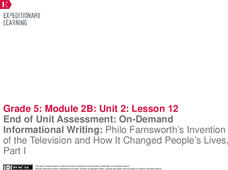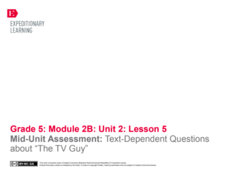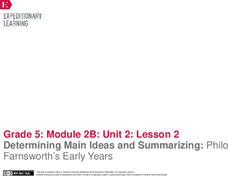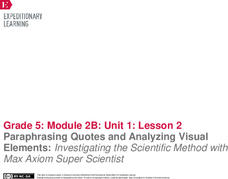Core Knowledge Foundation
Unit 8: Native Americans
Over five weeks, fifth graders listen to and discuss reading passages that explore the connection between Native Americans and nature. Following daily readings, scholars practice word work, including prefixes, root words, suffixes,...
Core Knowledge Foundation
Unit 6: The Reformation
Over three weeks, fifth graders read about and discuss the Reformation which saw religion and politics shift across Europe. Following daily readings, young scholars practice spelling, grammar, and morphology skills such as prefixes,...
Core Knowledge Foundation
Unit 5: A Midsummer Night’s Dream
Fifth graders analyze William Shakespeare's A Midsummer Night's Dream, paying close attention to character development, plot, and dialogue. With daily reading and thoughtful discussion, scholars take pen to paper to respond to journal...
Core Knowledge Foundation
Unit 4: The Renaissance
The Renaissance is the theme of a five-week unit designed to boost reading comprehension, spelling, vocabulary, and expository writing skills. Scholars listen to and discuss daily readings and engage in skills practice activities...
Core Knowledge Foundation
Unit 3: Adventures of Don Quixote
Fifth graders explore the Adventures of Don Quixote in a four-week language arts unit. Scholars listen to and discuss a new chapter each day as well as examine vocabulary and practice word work including suffixes, subject-verb agreement,...
Core Knowledge Foundation
Unit 2: Early American Civilizations
Fifth graders explore early American civilizations in a four-week ELA unit. Every lesson offers an opportunity to read and discuss a selected passage followed by word work that covers vocabulary, grammar, and morphology. Learners write...
Core Knowledge Foundation
Unit 1: Contemporary Fiction - They Call Me Güero: A Border Kid’s Poems by David Bowles
They Call Me Güero: A Border Kid's Poems by David Bowles is the focus of a five-week language arts unit unit. Fifth graders listen to various poems and participate in thoughtful discussions, examining vocabulary and learning new words in...
EngageNY
End of Unit Assessment: Text-Dependent Questions and Draft Editorial: The Mary River Project on Baffin Island
Scholars complete an assessment, read an informational article, and answer text-based questions. Also, pupils use the Painted Essay technique to write a draft editorial about a topic they studied throughout the unit, the Mary River Mine...
EngageNY
Conducting Research: Analyzing Text from the Qikiqtani Inuit Association (QIA)
Scholars read excerpts from the Qikiqtani Inuit Association website as they begin researching their case studies on the Mary River Project. They read an article to build background knowledge and analyze key vocabulary words using the...
EngageNY
Close Reading and Viewing: Minerals and Metals
How easy is it to live off the land? Scholars read Minerals and Metals in Your Life and discuss how Canada's natural resources meet the needs of the people. Pupils watch a brief video and discuss the gist of the text and video. They then...
EngageNY
Mid-Unit Assessment: On-Demand Note-Taking, Analysis, and Reflection: “Should We Drill?”
Pupils take a mid-unit assessment, completing a point of view graphic organizer based on an informational article about offshore drilling. Next, learners answer text-dependent and short-answer questions about the text.
EngageNY
Close Reading and Viewing: Nunavut Iron Ore Mine Approval
Using the thought-provoking resource, scholars continue researching opposing points of view about the Mary River Project proposal. They read an informational text, watch a video, and record the gist of the text and video in their journals.
EngageNY
Conducting Research: Analyzing Expert Texts about the Mary River Project
Pupils read informational texts about the Mary River Project, searching for the gist. As they read the expert texts, they complete a graphic organizer to identify and analyze point of view.
EngageNY
Video and Close Reading: “Developing a Vital Resource for Canadians and the World”
Scholars watch Developing a Vital Resource for Canadians and the World to learn about the supplement potash that helps plants grow. They watch the video several times, completing a note catcher to record key ideas along the way. Pupils...
EngageNY
Close Reading: “Natural Resources and the Canadian Economy”
Readers continue to learn how natural resources are important to Canada's economy. They read, annotate, and answer text-dependent questions about Natural Resources and the Canadian Economy. They then discuss key terms in the text.
EngageNY
Comparing Multiple Accounts of the Same Topic: The Story of Bus Desegregation (Promises to Keep, Page 21)
It's all connected. Learners read event details in Promises to Keep to determine the connection between the bus boycott and Jackie Robinson. They watch a video and read Rules for Riding Desegregated Buses to discover even more details to...
EngageNY
End of Unit Assessment: On-Demand Informational Writing: Philo Farnsworth’s Invention of the Television and How It Changed People’s Lives, Part I
On-demand isn't just for TV anymore. Writers complete their end of the unit assessment with an on-demand writing task. They read the article Television and answer questions about the gist, vocabulary, and content. They then complete a...
EngageNY
Mid-Unit Assessment: Text-Dependent Questions about “The TV Guy”
Say hi to the TV guy. Readers finish their mid unit assessments by reading The TV Guy and answering text-dependent questions. Learners complete multiple choice as well as short and long answer questions pertaining to comprehension,...
EngageNY
Determining Main Ideas and Summarizing: Philo Farnsworth’s Early Years
Teamwork makes the dream work! Learners work in groups to analyze pages 2-9 of The Boy Who Invented TV, The Story of Philo Farnsworth. They complete a first read to determine the gist and a second read to identify main idea and provide a...
EngageNY
Mid-Unit Assessment: Analyzing Visual Elements in a Graphic Novel
Can I get a visual? Scholars work on their mid-unit assessments by analyzing vocabulary and discussing visual elements in Investigating the Scientific Method with Max
Axiom Super Scientist. They then reflect on their learning by...
EngageNY
Paraphrasing Quotes and Analyzing Visual Elements: Investigating the Scientific Method with Max Axiom Super Scientist
Pay close attention. Learners discuss the things close readers do and record them in a chart. They then silently reading section 1 of Investigating the Scientific Method wit Max Axiom Super Scientist and write the gist of the text in...
EngageNY
Final Performance Task: Presenting Graphic Novelettes
Let's get graphic. Serving as the final performance task of the unit, scholars complete their graphic novelettes and design covers based on their sketches. Finally, they present their hard work to classmates.
Florida Center for Reading Research
Vocabulary: Morphemic Elements, Rooting for Meaning!
Scholars work with root and meaning cards to build vocabulary skills. Playing with a partner, learners read a root, locate its meaning, and cover it with a counter. The first player to cover their board wins.
Houghton Mifflin Harcourt
Give It All You’ve Got!: English Language Development Lessons (Theme 2)
Go beyond the textbook to gain a better appreciation for the English language. A series of ESL lessons help expand the concepts found in Theme 2: Give It All You've Got. The second lesson in a three-part unit incorporates strategies such...




